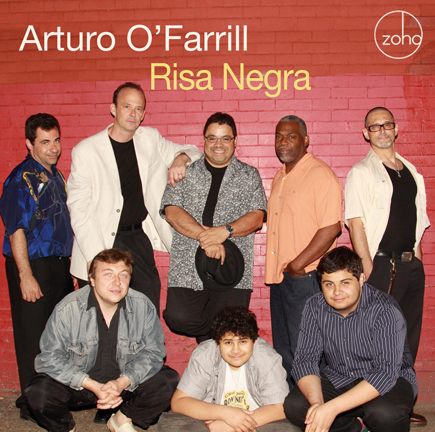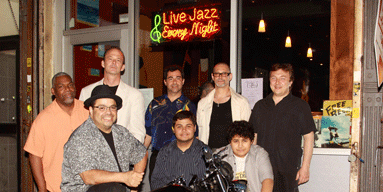|
Arturo O'Farrill
Risa Negra
Release Date: October 13, 2009
Selection #: ZM 200910
UPC Code: 880956091020
Availability: Worldwide
Songs:
1. ONE ADAM 12 MAMBO 6:34
2. GOAT CHECK 7:01
3. BLUE STATE BLUES 5:49
4. THE DARKNESS IS MY CLOSEST FRIEND 10:13
5. NO WAY OFF 9:14
6. CRAZY CHICKEN 4:58
7. TABLA RASA : EL SALON CUBANO 5:17
8. TABLA RASA : TINTAL TINTAL DEO 10:45
9. CEVICHE 4:29
10. ALISONIA 2:29
|
Musicians:
ARTURO O’FARRILL - piano, Fender Rhodes piano
JIM SEELEY - trumpet
DAVID BIXLER - alto sax
BORIS KOSLOV - acoustic& electric bass, all tracks exc. 6 – 8
VINCE CHERICO - drums, all tracks except 6
ROLAND GUERRER - percussion
with
HEATHER BIXLER - violin, track 8
ALISON DEANE - piano, track 5, 7 & 8
ADAM O’FARRILL - trumpet, track 6
ZACHARY O’FARRILL - drums, track 6
IVAN RENTA - tenor sax, tracks 3 & 6
RICKY RODRIGUEZ - acoustic bass, tracks 3, 6 – 8
BADAL ROY - tablas, track 8
CECILIA TENCONI - flute, tracks 7, 8
|
 |
|
The jury is out on the iPod generation. It would take years of non-stop listening to get through the music on some people’s players. For these types, it’s not love of music, it’s ownership. They tend to use music as wallpaper. There are not many serious music listeners left, the kind that turn off all electronic diversions, sit down in a comfy chair, close their eyes and allow the music to take them away.
My father Chico had a daily listening time - classical, latin, jazz, pop, no distinctions. He loved all good music. This recording is for him and for those like him. It is a latin/jazz/funk/classicallistening session. If you want a neatly categorized jazz moment, bypass this product, go to the jazz institutions instead. There you can have your music, temperature-controlled, sanitized and explained.
However, if you have a comfy chair, a sweet pair of speakers, the time to invest, then please let this music, made with love, respect and awe, lead you where it will. Every composition is a short story. The important thing is that you sit still, open your ears and receive musical offerings and blessings.
This recording is a family affair, literally, my wife, pianist Alison Deane, my sons Zachary and Adam O’Farrill, and some of my best friends all taking part. The musicians are all equally brilliant, not full of themselves, instead giving of themselves fully. They represent the Caribbean, the Midwest, Latin America, Russia, India and every hue and skin tone imaginable. This record was made in Brooklyn by a consortium of non-elitists, preferring to work hard for the art instead of the big record conglomerate paycheck, music made by people, for people, for listening.
One Adam 12 Mambo was written for my youngest son Adam when he was twelve (going on forty.) The melody, based on simple major triads, a pentatonic scale that floats over shifting chromatic chords, and complicated syncopations, reflect his personality. He is an uncomplicated dude but with a deep personality and profound musical insight. Saxophonist David Bixler said something about the difficulty of the changes and then tore through them anyway. Percussionist Roland Guerrero also smokes from the go. The title is a play on the name of an ancient TV show. I guess I’m forty-eight going on twelve.
The goats have no manners: they’ll walk into a Yankees bar wearing a Mets cap. They’ll eat without plates. They’re loud, smelly and ornery. They refuse to check their coats at the goat check. We need to impose order on them. The bassist goat is particularly reprehensible, insisting on bringing that electric thing to a “jazz” record date, and then playing it with alarming skill and funkitude. Where do they learn this behavior? It is appropriate that we force them to play with a backbeat, an electric piano, to play what my friend Tom Kamber calls “hubcap stealing music”. This David Bixler composition is called Goat Check.
Blue State Blues was written the day after George W. Bush was reelected in 2004. I won’t tell you if I was giving or getting the blues but I will say I recently happily considered renaming it Red State Blues. It begins with two of the most in-demand bass players on the planet trading choruses, Ricky Rodriguez on acoustic, Boris Koslov on electric. They don’t just trade choruses but cultures. Ricky employs the venerated jazz tradition of quoting in his solo, but unlike the corn-ball usage of Salt Peanuts, my man quotes Chick Corea’s Matrix, talk about hip. Ivan Renta is one of the most amazing young tenor sax voices.
The Darkness is My Closest Friend is the feel-good hit of the year, at least from a player’s standpoint. The pace, so sweet, the melody shifts so delicately and the harmony so rich and fun to play on that it’s somehow reassuring to perform. A lot of David Bixler’s music is like this, thoughtful, quirky, original and always fun to play. I’m not sure if he meant this piece to be thought as “fun”. Boris’ bass solo captures this dichotomy, being both searching and reassuring at once.
No Way Off was written somewhere in the middle of the Atlantic Ocean where my sextet was performing on a world cruise. After 10 days at sea on an all Japanese ship, (Japanese is not our first language) and only each others’ company, we were ready to kill each other. Instead I composed this piece.
Crazy Chicken is a composition written by the aforementioned Adam O’Farrill and features him on trumpet (he’s now fourteen) and his seventeen-year old brother, Zachary, on drums. Again the brilliance of Ricky and saxophonist Ivan Renta shines. Trust me: this piece is not easy to play, read or improvise on, but it is incredibly fun, I’m just glad I could keep up. The future of the music is in safe hands. Now go clean up your room!
|
 Originally commissioned by The Philadelphia Music Project for Dr. Maria Taylor and Latin Fiesta, part of a collaboration with Tania Leon, this arrangement of Tabla Rasa is in two movements. El Salon Cubano is a sound painting of turn of the century Cuba, the days when every home had a salon, a piano (much as we had here in turn of the century New Orleans) and an amateur pianist. It is not a literal interpretation of the music from the period, but rather evocative of that era, when the beginnings of Latin were inseparable from the beginnings of jazz. Though jazz purists hate to admit it, the roots of both jazz and latin are African and inexorably tied to one another. It is impossible to discuss jazz without fully understanding and giving full weight to its Latin American cousin. Originally commissioned by The Philadelphia Music Project for Dr. Maria Taylor and Latin Fiesta, part of a collaboration with Tania Leon, this arrangement of Tabla Rasa is in two movements. El Salon Cubano is a sound painting of turn of the century Cuba, the days when every home had a salon, a piano (much as we had here in turn of the century New Orleans) and an amateur pianist. It is not a literal interpretation of the music from the period, but rather evocative of that era, when the beginnings of Latin were inseparable from the beginnings of jazz. Though jazz purists hate to admit it, the roots of both jazz and latin are African and inexorably tied to one another. It is impossible to discuss jazz without fully understanding and giving full weight to its Latin American cousin.
The second movement, Tintal Tintal Deo shows the connection of all these cultural entities to the hand drum through the Tabla. Jazz is more than a genre distilled by a precious-few cultural power brokers. Musical improvisation is a universal constant, like breathing, an irrevocable truth, more ancient than any single peoples or cultures. I do not try to replicate Indian music here. That would be arrogance. Instead I use the basic Indian tala, the Tintal pattern and build a prayerful meditation on it. Badal Roy is master musician whose playing reaches across geographical and cultural boundaries.
My friend Jim Seeley keeps me grounded, his writing and playing always reminds me that music is pure soul and truth. We all pray the blues in our various languages. It is our attempt to reach out beyond our temporal frames and sing the song of the Divine. Ceviche is Jim reminding me to “keep it O’for-real”.
My best friend Alison lives in a universe where everything is well ordered and sleeping dogs lie. It directly contrasts my planet where all is chaos; everything’s last minute and I can never find my keys. I guess this is why we are good for each other. She still amazes me every day and I still exasperate her every day. It’s a balance. I call where she lives Alisonia.
The words Risa Negra translate into “black laughter”. I remember being little and my father would sometimes laugh so hard that his face would contort into what could easily be mistaken for death throes. It amazed my sister and I that he could experience such intense pleasure. We’d intentionally try and provoke him into these states of pure bliss, these states where the line between laughter and pain was thin, reflecting the dual nature of our existence, neither state being the defining one of existence.
When I look out on these musicians, experiencing the amazing music we play, meet the wonderful people who come to hear us, when I see my young musician-sons realizing they are as big-hearted as they are talented, when I gaze upon my sweet Alison, my mother Lupe’s fierce pride in all of us, the legacy of my father, the young musicians I have the privilege of teaching, the friends who support the work of The Afro Latin Jazz Alliance, those whom I have by my side as we struggle to break free from cultural tyranny, mediocrity and small-mindedness, when I take into account these astonishing facets of my life, I am tempted to break out in wild peals of complete , shameless and unrelenting risa negra.
- Arturo O’Farrill
Produced by Arturo O’Farrill in association with The Afro Latin Jazz Alliance. Assistant producer Eric Oberstein. Recorded April 12 – 13, 2009 at Peter Karl Studios, Brooklyn, NY. Mixed by Peter Karl, Arturo O’Farrill and Eric Oberstein. Mastering by Peter Karl. Photography: Jerry Lacay. Package design: Al Gold. Executive Producers: Alison Deane & Joachim “Jochen” Becker.
|
|
|
|

